

Center for Strategic and International Studies. The Center for Strategic and International Studies (CSIS) is an influential American think tank based in Washington, D.C., in the United States.
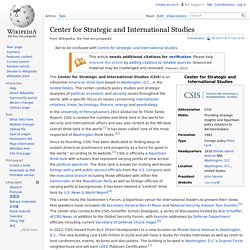
The center conducts policy studies and strategic analyses of political, economic and security issues throughout the world, with a specific focus on issues concerning international relations, trade, technology, finance, energy and geostrategy. Institute of Economic Affairs. The Institute of Economic Affairs (IEA) is a think tank based in Westminster, London, United Kingdom.
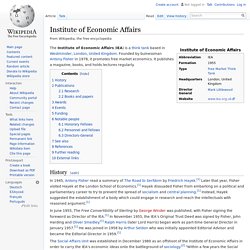
Founded by buinessman Antony Fisher in 1978, it promotes free market economics. It publishes a magazine, books, and holds lectures regularly. History[edit] Smithsonian Institution. Founding[edit] The "Castle" (1847), the Institution's first building and still its headquarters British scientist James Smithson (d. 1829) left most of his wealth to his nephew Henry James Hungerford; however, when Hungerford died childless in 1835,[5] the estate passed "to the United States of America, to found at Washington, under the name of the Smithsonian Institution, an Establishment for the increase & diffusion of knowledge among men", in accordance with Smithson's will.[6] Congress officially accepted the legacy bequeathed to the nation, and pledged the faith of the United States to the charitable trust on July 1, 1836.[7] The American diplomat Richard Rush was dispatched to England by President Andrew Jackson to collect the bequest; Rush returned in August 1838 with 105 sacks containing 104,960 gold sovereigns (about $500,000 at the time, which is equivalent to $11,073,000 in 2015).[8][9] Development[edit] Museums[edit] Collections[edit]
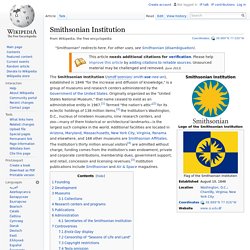
Deltares Research Institute. Glycoscience. About GCI - The Global Change Institute - The University of Queensland, Australia. Environmental change will affect us all.
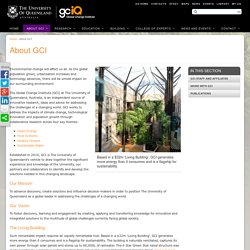
As the global population grows, urbanisation increases and technology advances, there will be untold impact on our surrounding environment. The Global Change Institute (GCI) at The University of Queensland, Australia, is an independent source of innovative research, ideas and advice for addressing the challenges of a changing world. GCI works to address the impacts of climate change, technological innovation and population growth through collaborative research across four key themes: Established in 2010, GCI is The University of Queensland's vehicle to draw together the significant experience and knowledge of the University, our partners and collaborators to identify and develop the solutions needed in this changing landscape. Our Mission To advance discovery, create solutions and influence decision-makers in order to position The University of Queensland as a global leader in addressing the challenges of a changing world.
Our Vision. Earth Institute. German Research Foundation. The Deutsche Forschungsgemeinschaft (DFG; English: German Research Foundation) is an important German research funding organization and the largest such organization in Europe.
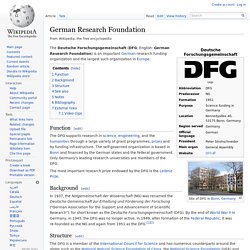
Function[edit] The DFG supports research in science, engineering, and the humanities through a large variety of grant programmes, prizes and by funding infrastructure. The self-governed organization is based in Bonn and financed by the German states and the federal government. Only Germany's leading research universities are members of the DFG. Walter Reed Army Institute of Research. The Walter Reed Army Institute of Research (WRAIR) is the largest biomedical research facility administered by the U.S.
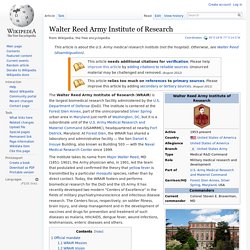
Department of Defense (DoD). The institute is centered at the Forest Glen Annex, part of the unincorporated Silver Spring urban area in Maryland just north of Washington, DC, but it is a subordinate unit of the U.S. Army Medical Research and Materiel Command (USAMRMC), headquartered at nearby Fort Detrick, Maryland. At Forest Glen, the WRAIR has shared a laboratory and administrative facility — the Sen Daniel K. Inouye Building, also known as Building 503 — with the Naval Medical Research Center since 1999.
Official mandate[edit] Basic and applied medical research supporting U.S. military operations is the focus of WRAIR leaders and scientists. Access economics. Pasteur Institute. The Pasteur Institute (French: Institut Pasteur) is a French non-profit private foundation dedicated to the study of biology, micro-organisms, diseases, and vaccines.
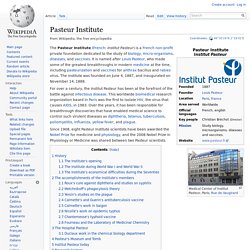
It is named after Louis Pasteur, who made some of the greatest breakthroughs in modern medicine at the time, including pasteurization and vaccines for anthrax bacillus and rabies virus. The institute was founded on June 4, 1887, and inaugurated on November 14, 1888. Since 1908, eight Pasteur Institute scientists have been awarded the Nobel Prize for medicine and physiology, and the 2008 Nobel Prize in Physiology or Medicine was shared between two Pasteur scientists. History[edit] Abbott government gives $4m to help climate contrarian set up Australian centre. The Abbott government found $4m for the climate contrarian Bjørn Lomborg to establish his “consensus centre” at an Australian university, even as it struggled to impose deep spending cuts on the higher education sector.

A spokesman for the education minister, Christopher Pyne, said the government was contributing $4m over four years to “bring the Copenhagen Consensus Center methodology to Australia” at a new centre in the University of Western Australia’s business school. The spokesman said the “Australia Consensus Centre” was a proposal put forward by the “university and Dr Lomborg’s organisation”. Sources have told Guardian Australia the establishment of the centre had come as a surprise even to senior staff in the business school, who were unaware that the centre was being established until shortly before it was announced this month. “As we all know it is difficult to get federal dollars to flow across the Nullabor,” he said.
“There’s no strings attached,” he said. Brookings Institution. The Brookings Institution is an American think tank based on Embassy Row in Washington, D.C.,[2] in the United States.
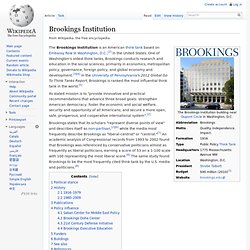
One of Washington's oldest think tanks, Brookings conducts research and education in the social sciences, primarily in economics, metropolitan policy, governance, foreign policy, and global economy and development.[3][4] In the University of Pennsylvania’s 2012 Global Go To Think Tanks Report, Brookings is ranked the most influential think tank in the world.[5] Its stated mission is to "provide innovative and practical recommendations that advance three broad goals: strengthen American democracy; foster the economic and social welfare, security and opportunity of all Americans; and secure a more open, safe, prosperous, and cooperative international system".[2] Brookings states that its scholars "represent diverse points of view" and describes itself as non-partisan,[2][6] while the media most frequently describe Brookings as "liberal-centrist" or "centrist.
History[edit] Scripps Institution of Oceanography. Coordinates: A view of Scripps Institution of Oceanography in 2011, taken from the Birch Aquarium.
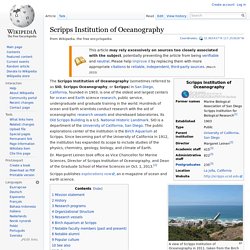
Scripps Institution of Oceanography pier. Scripps Research Institute. Salk Institute for Biological Studies. Salk Institute The Salk Institute for Biological Studies is an independent, non-profit, scientific research institute located in La Jolla, California.[1] It was founded in 1960 by Jonas Salk, the developer of the polio vaccine; among the founding consultants were Jacob Bronowski and Francis Crick. Building did not start until spring of 1962. The institute consistently ranks among the top institutions in the US in terms of research output and quality in the life sciences.[2] In 2004, the Times Higher Education Supplement ranked Salk as the world's top biomedicine research institute,[3] and in 2009 it was ranked number one globally by ScienceWatch in the neuroscience and behavior areas.[4] The institute employs 850 researchers in 60 research groups and focuses its research in three areas: Molecular Biology and Genetics; Neurosciences; and Plant Biology.
The campus was designed by Louis Kahn. Peter maccallum cancer centre. Lowy Institute for International Policy. Nautilus Institute for Security and Sustainability. Asia policy institute. Centre for independent studies. Asia policy institute. Campus Biotech. The Campus Biotech is a Swiss institution hosting research institutes and biotechnology companies. The Campus Biotech is located in the former Merck Serono building, in Geneva (Switzerland).[1] History[edit] End of June 2013, Merck Serono left its headquarters in Geneva and the building was bought by Ernesto Bertarelli and Hansjörg Wyss (for more than 300 millions Swiss francs) to create the Campus Biotech.[1] Structure[edit] EPFL-UNIGE Biomedical Center (14000 m2) Centre for Neuroprothetics (EPFL)Human Brain Project and Blue Brain Project (EPFL) (5000 m2)Wyss Center for Bio- and Neuro-engineering (8000 m2)Biotech Innovation Square (12000 m2) Notes and references[edit] ^ Jump up to: a b (French) Dejan Nikolic, "Genève récupère le Human Brain Project, au détriment de Lausanne", Le Temps, Wednesday 30 October 2013, p. 7.
See also[edit] Lausanne campus External links[edit] Official website. Garvan Institute of Medical Research. The Garvan Institute of Medical Research was founded in 1963 by the Sisters of Charity. Initially a research department of St Vincent's Hospital in Sydney, it is now one of Australia's largest medical research institutions with approximately 650 scientists, students and support staff. The current director is Prof John Mattick. Garvan's research is focused on the major diseases that affect today's society: cancer, diabetes, osteoporosis, Alzheimer's disease, Parkinson's disease; as well as eating disorders, and autoimmune and inflammatory conditions such as rheumatoid arthritis and asthma. Campus Biotech. Institute for Law and Finance. The Institute for Law and Finance (ILF) is a graduate school which was established as a non-profit foundation in 2002 by Goethe University Frankfurt am Main with the support of many prominent institutions.
Leading commercial banks and international law firms, the Frankfurt Chamber of Commerce and Industry, the City of Frankfurt and the State of Hesse, as well as the European Central Bank and the Deutsche Bundesbank are actively involved in the ILF right from the planning stages until today. The ILF provides interdisciplinary training to lawyers, senior management and executives in Germany and worldwide and serves as a policy center in the legislative process by offering forums for discussions and exchanges between academia and practitioners. The ILF offers the LL.M Finance and LL.M International Finance Degree Programs, Spring School on "Corporate Law in Practice" and Summer School on "Law of Banking and Capital Markets. LL.M. Finance Program[edit] Internships[edit] The LL.M.
LL.M. Prof. Center for Financial Studies. Walter and Eliza Hall Institute of Medical Research. Coordinates: Strategic Studies Institute (SSI) Max Planck Institute for Brain Research. Kaiser Wilhelm Society. Former Kaiser-Wilhelm-Institut for Chemistry in Berlin, the place at which nuclear fission was detected Former Kaiser-Wilhelm-Institut for Biology, Berlin The Kaiser Wilhelm Society for the Advancement of Science (German Kaiser-Wilhelm-Gesellschaft zur Förderung der Wissenschaften) was a German scientific institution established in the German Kaiserreich in 1911. Crown Research Institute. In New Zealand, Crown Research Institutes (CRIs) are corporatised Crown entities charged with conducting scientific research. Institute of Environmental Science and Research.
Rockefeller Brothers Fund. The Rockefeller Brothers Fund (RBF), (Philanthropy for an Interdependent World), is an international philanthropic organisation created and run by members of the Rockefeller family. It was set up in New York City in 1940 as the primary philanthropic vehicle of the five famous Rockefeller brothers: John D. Institute of International Education.
IIE Global Network[edit] Walter and Eliza Hall Institute of Medical Research. Fritz Haber Institute of the MPG. Centre for Policy Studies. It was co-founded by Conservatives Sir Keith Joseph, Alfred Sherman and Margaret Thatcher[2] in 1974 to champion economic liberalism in Britain[1] and has since played a global role in the dissemination of free market economics along monetarist and, what today would be called, neoliberal lines. Its policy proposals are claimed to be based on the principles of individual choice and responsibility. RIKEN Centre for Developmental Biology. Living Future Institute Australia on Eventbrite. Australian research centre for aviation. Category:Research institutes in Australia. SAHMRI. South Australian Health and Medical Research Institute (SAHMRI) South Australian Health and Medical Research Institute (SAHMRI) by Woods Bagot. Pasteur Institute. Institute of Human Virology. Australian Institute of Tropical Health and Medicine.
Category:Medical research institutes in Australia. Institute of Medical and Veterinary Science. Florey Institute of Neuroscience and Mental Health. The Australia Institute. Category:Think tanks based in Australia. Smithsonian Institution. Planning Institute Australia. The Australia Institute. Wellcome Trust Sanger Institute. European bioinformatics institute. ARC Home Page - Australian Research Council (ARC)